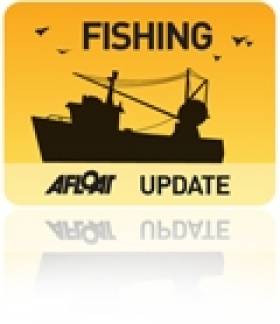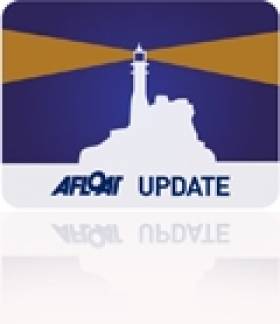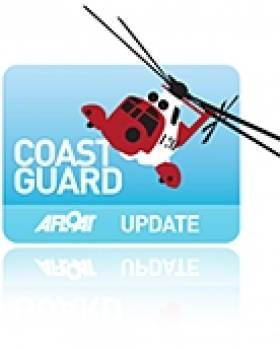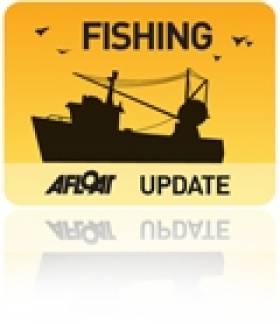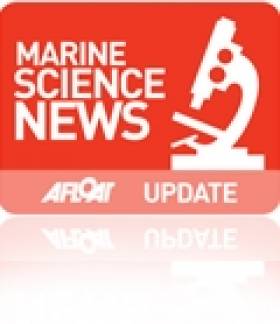Displaying items by tag: Simon
Ireland Catches Record EU Fisheries Deal
#FISHERIES – There has been a record outcome for Ireland at EU Fisheries negotiations with a total Value of 2012 Fishing Opportunities of €250 million it was announced early this morning.
Following the conclusion of lengthy and complex EU fisheries negotiations the Minister for Agriculture, Food and the Marine, Simon Coveney TD, said "I am delighted at the outcome of these negotiations which delivered my key priorities and will allow the Irish fishing fleet to look forward to 2012 with optimism. The measures agreed in these negotiations will maximise employment and economic activity in our coastal communities." The Minister said that he had secured "141,000 tonnes of pelagic and tuna quotas and 36,000 tonnes of whitefish. I am satisfied that this will provide an excellent range of opportunities for our fishing industry in 2012."
Minister Coveney was speaking after three days of intensive negotiations, which concluded in the early hours of this morning. The Minister described the Council as "very challenging" and said that "my priority from the outset was to achieve an outcome that protected the Irish fishing industry while respecting the most up-to-date scientific data for priority stocks of critical importance to our fleets."
Mr Coveney described the reopening of the Irish Sea prawn fishery as "a very significant hard-won achievement, which will allow Irish fishing vessels to return to this important fishery immediately." This fishery had been closed in mid-October and was due to remain closed until 1 February 2012 but will now reopen after Minister Coveney secured additional fishing effort entitlements for the Irish fleet.
The Minister highlighted the agreement on total allowable catches (TACs) and quotas in 2012 on a number of species of particular economic importance to the Irish industry including the agreement to maintain quotas of prawns in the Irish Sea and off the south and south-west coasts. This fishery is estimated to be worth €52 million in 2012.
Mr Coveney said that "there is very good news for the fisheries along the south coast". The Irish quota for cod in the Celtic Sea is increasing by 77 per cent. He said that the Commission accepted the strong case he made for an increase in quotas for haddock and whiting in the Celtic Sea of 25 per cent and 15 per cent respectively which the Minister said "were entirely justified on the scientific data which I presented to the Commission." The original Commission
proposal was for a 25 per cent reduction in both stocks. The Minister said that the increases in these quotas would be worth an extra €3.5 to the south coast fishing industry. In addition, this morning's agreement ensures that quotas for Pollock and Saithe in the Celtic Sea will remain at existing levels next year. A very positive element in securing the future of these fisheries was the commitment to adopt new measures to reduce discarding of small fish in the Celtic Sea.
In addition, the Irish quota for Celtic Sea herring is increasing from 11,407 tonnes to 18,236 tonnes, a 60 per cent increase. "These are valuable quota increases and will support additional onshore employment in the processing industry." The Minister noted this increase was due to conservation measures in the Celtic Sea and responsible conservation management in recent years in partnership with the industry.
The Minister also negotiated a very significant increase in the Irish quota of 155 per cent for the spring Boarfish fishery off the south-west coast. This quota, which the Minister described as "a new and very exciting fishery" will increase from 22,227 tonnes to 56,666 tonnes.
There is a very significant increase of 200 per cent in the haddock quota off Donegal. There is also agreement that the Commission would bring forward new rules by the middle of February to assist catching of this greatly increased quota.
Mr Coveney recognised the position in relation to cod in the Irish Sea and accepted the proposal to reduce the TAC for 2012 by 25 per cent. "This approach is consistent with scientific advice and adherence with the Long Term Management Plan, which is designed to ensure that the stock recovers to sustainable levels in the future. This is vitally important from both an industry and conservation perspective."
The important €9 million quota for the Albocore Tuna summer fishery, off the south-west coast, has been increased by 342 tonnes to 3,896 tonnes for 2012. The Blue Whiting quota for the spring fishery, off the north-west coast, has increased from 1,187 tonnes this year to 7,498 tonnes for 2012.
From the outset of the negotiations an absolute priority for Ireland was the satisfactory application of the Hague Preferences, which are of crucial, political economic importance for this country and have been successfully protected.
Finally, Mr Coveney said he was satisfied that Ireland had achieved what was necessary in this year's negotiations to provide significant opportunities for the fishing industry and coastal communities around the country and will protect our fishing stocks for future sustainability.
Government Minister Commends Emergency Services in Fastnet Rescue
"This was a dramatic sea rescue that was co-ordinated with speed and professionalism and everybody involved should be commended for their efforts. This is a reminder of just how important it is for Ireland to have a well resourced sea rescue infrastructure."
Minister Coveney went on to say "The Fastnet race is one of the most high-profile offshore yacht races in the world and Rambler 100 is one of the best known racing yachts on the planet. This incident will be reported in the international press and we can be proud of the way in which Irish emergency services contributed to preventing any loss of life."
"Most importantly, my response is one of relief that there was no loss of life, which considering the size and speed of the yacht and the conditions at the time, is a minor miracle. I hope everyone involved will make a full recovery."
'Following continuing contact with the OPW, it has been confirmed to me that a new contract for the construction of the new station has been awarded and work is to start very soon. This tender process has been ongoing for more than a year and I am delighted that it has finally been awarded and work to commence shortly.'
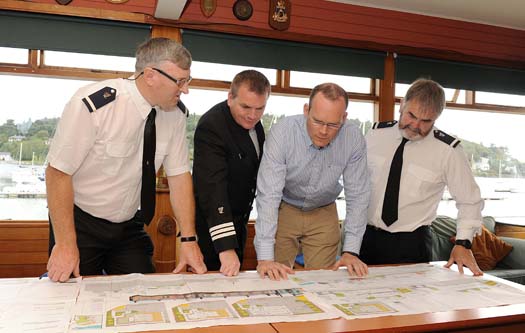
Marine Minister Simon Coveney TD with Victor Shine Deputy Area Officer Crosshaven Coast Guard Unit, Vincent Farr Area Officer and James Furlong Unit Member looking over the plans for the new €1.5 Million Coast Guard Station at Crosshaven, Co. Cork. The contract has been awarded to Blarney firm Cumnor Constuction Ltd and work will commence shortly. Photos Billy macGill
'Those who work at Crosshaven Coast Guard are to be commended for their commitment and dedication to the local community in a voluntary capacity. We must now ensure that they are working in a station that reflect this loyalty and high standard of service.'
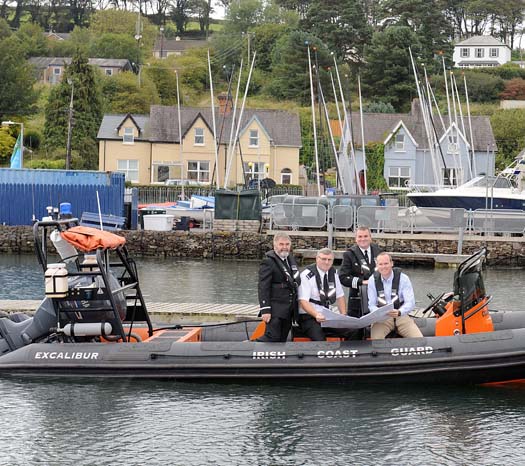
The contract has been awarded to Cumnor Construction Ltd. of Blarney on August 3rd. Work on the site is expected to commence very shortly.
Visiting Castletownbere this weekend, the Minister for Agriculture, Food and the Marine, Simon Coveney TD, announced a 'Special Assistance for Young Fishermen' scheme. Fishermen under 40 years of age who have not previously owned a fishing vessel can avail of grant aid up to 15% (to a maximum of €50,000) of the acquisition cost of a second-hand whitefish vessel.
Speaking about the scheme the Minister called it, "a positive stepping stone for future entrepreneurship within the fishing industry". He also highlighted how "new blood and fresh thinking are essential for the ongoing development of any industry. This Scheme will assist and enable young fishermen who have a proven track record within the sector to set themselves up as managers of their own vessels, set their own targets and goals, and hopefully impart their knowledge to those they take on to work with them."
The Minister also announced €84,000 in grant aid for seven seafood companies in the Cork area under the BIM Seafood Value Adding Scheme. The grant aid underpins an overall investment of €213,500 in the area.
As he announced the grant aid, the Minister congratulated the companies on their successful projects, "Focusing on innovating and adding value will secure a long term, competitive future for Irish seafood companies. It is heartening to witness the level of ingenuity and creativity coming from these companies, backed by a sound business capacity. It really bodes well for the seafood industry's future in Cork".
The Minister has also requested that BIM would begin a comprehensive economic survey of the Castletownbere area to determine the level of seafood activity in the area and establish its economic importance for the region. Minister Coveney said "This Report will provide hard economic evidence on the dependence and economic importance of seafood in the region. This will help to inform future policy making for the area at Local, National and EU level. With the completion of world class harbour facilities in Castletownbere in the coming months it is vitally important that everybody can work together to maximise the true economic potential of the Region. I feel this study by BIM, highlighting the economic importance of the Seafood sector for the Region, will help to drive on the development of the industry in West Cork and Castletownbere in particular".
Adding value to Irish seafood is a key strategic driver for BIM as Ireland's seafood development agency and they estimate that an additional €50 million in value added seafood sales can be created by 2012. The opening of BIM's Seafood Development Centre in 2009 has encouraged significant uplift in new product development and innovation, with 178 seafood companies availing of its services in 2010. For more information on the Seafood Value Adding Scheme visit www.bim.ie
'The Sea: One of Ireland's Greatest Natural Resources' - Coveney
The Minister was speaking during a visit to the Marine Institute's research vessel, RV Celtic Explorer, on its return from a mission to the Labrador and Newfoundland Seas.
He added "I am particularly pleased that this is my first official engagement as Minister for Agriculture, Marine and Food. The work of the RV Celtic Explorer highlights the essential nature of marine research, development and sustainable management, through which Ireland is developing a strong and well-deserved reputation as an emerging centre of excellence, where we have prominent roles in many European and international marine science bodies."
Minister Coveney commended the Marine Institute and its Chief Executive, Dr Peter Heffernan, for its leading and proactive role in the areas of fisheries science, marine environment and food safety as well as ocean science and said that he looked forward to working closely with the Institute and benefitting from the research and advice which they would undertake and provide.
The Minister noted that Ireland's two national research vessels – RV Celtic Explorer and RV Celtic Voyager – will record 267 days at sea during 2011, during which they will be engaged in fisheries surveys, underwater mapping, climate studies and deepwater surveys.
Simon Coveney Appointed Marine Minister
Cork sailor Simon Coveney (38) has been appointed as Minister of Agriculture, Food and Marine in the new cabinet of the Fine Gael/Labour Government formed yesterday.
The announcement has been welcomed by various marine interests pleased to see Marine back at the cabinet for the first time since the Department was dismantled by Fianna Fail's Bertie Ahern in 2002.
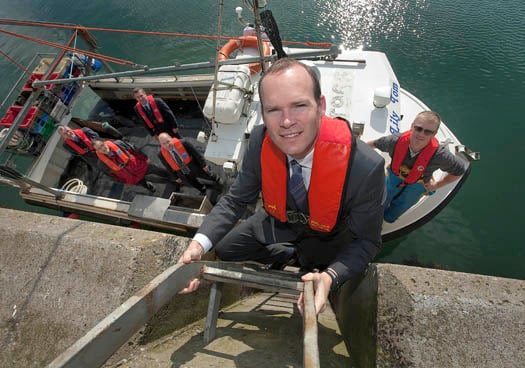
Marine Minister Simon Coveney TD
The appointment means Taoiseach Enda Kenny has kept good an election promise to reinstate the Marine department. A decade of lost opportunties has meant the sector has suffered through lack of infrastructure and coastline planning.
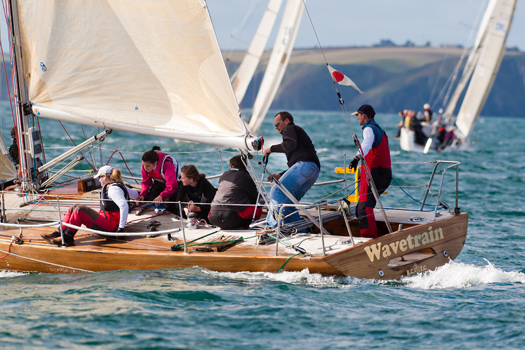
Simon Coveney at the helm of his yacht Wavetrain. Photo: Bob Bateman
"Simon is someone who understands the Sea as a sailor himself but also in his work as an MEP where he was involved in a number of major European maritime projects. This is a great opportuinty for the Marine. We look forward to working with him to develop this untapped resource." said David O'Brien of the Irish Marine Federation.
Simon was first elected to the Dáil in 1998 as one of Fine Gael's youngest TD's aged 26. He replaced his father Hugh Coveney TD following his untimely death.
Simon follows his father in to the post of Marine Minister. Hugh held the post in 1994.
Simon holds a B.Sc. in Agriculture and Land Management from Royal Agriculture College, Gloucestershire. He was also educated at Clongowes Wood College, County Kildare; University College Cork, and Gurteen Agricultural College, County Tipperary.
A keen fan of all competitive sport he has worked as a sailing instructor at his club Royal Cork Yacht Club in Crosshaven and been involved in many sailing regattas.
In 1997/8 he led the "Sail Chernobyl Project" which involved sailing a boat 30,000 miles around the world and raising €650,000 for charity.
In 2006 he contributed to RTE's series The Harbour and in a memorable quote, the Cork TD and former MEP said: "When somebody asks me the question, what's the one thing that's special about Cork?, I'd say the harbour."



























